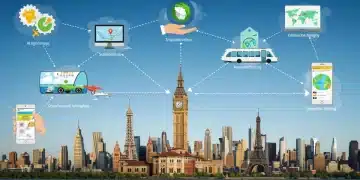Industry insights on hospitality technology advancements

Data analytics plays a vital role in hospitality by enhancing guest satisfaction, improving operational efficiency, refining marketing strategies, and providing actionable insights through advanced tools.
Industry insights on hospitality technology advancements are reshaping how hotels and restaurants operate. Have you ever wondered how tech innovations can enhance your travel experience? Let’s explore the exciting developments in this field.
The impact of technology on guest experiences
The impact of technology on guest experiences in the hospitality industry is profound. Technology not only enhances convenience but also elevates the overall guest experience. Hotels and restaurants are increasingly adopting innovative solutions to meet customer expectations.
Enhancing Customer Interactions
Technology facilitates faster and more efficient interactions between guests and staff. For example, mobile check-in and check-out options allow guests to skip long lines, making their stay more enjoyable. These conveniences are just the tip of the iceberg.
- Mobile apps provide easy access to room service.
- Smart room controls let guests adjust lighting and temperature easily.
- Virtual concierges offer personalized recommendations at the touch of a button.
Moreover, the integration of technology into hospitality management improves the service quality. Data collected through guest interactions can help businesses tailor their offerings, leading to enhanced satisfaction.
Personalizing the Experience
With the power of data analytics, hotels can gain insights into individual preferences. This technology allows for a more personalized experience, making guests feel special and valued. Imagine arriving at your hotel, and your favorite snack is waiting in your room, or the staff know your name upon check-in; this is all made possible through sophisticated data-driven tools.
Additionally, feedback systems integrated into mobile apps allow guests to communicate their needs and preferences in real-time. Using guest feedback ensures that any issues are addressed promptly, contributing to a seamless stay.
As we continue to see the rise of emerging technologies like artificial intelligence and machine learning, the guest experience will only become more refined. These advancements allow for proactive service, anticipating guest needs before they even voice them.
- Automated systems can manage bookings and room allocations efficiently.
- AI chatbots provide instant assistance 24/7.
- Smart technologies are being integrated into restaurant menus.
In conclusion, the impact of technology on guest experiences is something that cannot be underestimated. It is reshaping how we interact with the hospitality industry, leading to improved service, enhanced personalization, and ultimately a more memorable stay.
Innovative tools transforming hotel management

Innovative tools are transforming hotel management in incredible ways. These advancements streamline operations and enhance guest satisfaction. With the right technology, hotels can provide personalized experiences that keep guests coming back.
Automation in Routine Tasks
One major innovation is automation. This technology reduces the manual workload for staff, allowing them to focus on guest interactions. Automated check-in and check-out systems optimize the experience, minimizing wait times for guests. This shift has made hotel operations smoother and more efficient.
- Self-service kiosks improve guest flow.
- Automated inventory management ensures supplies are always stocked.
- Dynamic pricing tools adjust rates in real-time based on demand.
Additionally, these tools provide important data insights. Managers can see trends in occupancy rates and guest preferences, enabling better decision-making. Access to this data allows hotels to adapt quickly to changes in the market.
Guest Engagement Platforms
Another area of innovation is in guest engagement platforms. These digital tools create seamless communication between guests and hotel staff. Whether it’s through mobile apps or online portals, guests can easily request services or ask questions. This immediacy enhances their overall experience.
Guest engagement platforms also allow hotels to collect feedback effectively. Implementing surveys and having customer review options within the platform make it easier for management to identify areas for improvement. Understanding guest moods and preferences leads to higher satisfaction rates.
- Guests can access hotel services directly through their devices.
- Personalized recommendations enhance the stay.
- Feedback systems help address concerns promptly.
The integration of these innovative tools in hotel management means a more organized, responsive, and guest-friendly experience. As technology continues to evolve, hotels that adopt these innovations will stand out in a competitive market.
Future trends in restaurant technology
Future trends in restaurant technology are shaping how diners interact with their meals. As technology continues to evolve, it plays a crucial role in enhancing efficiency and guest experiences. Embracing these trends will allow restaurants to thrive in a competitive market.
Contactless Dining Experiences
The rise of contactless dining is a significant trend gaining momentum. Guests now prefer touchless interactions to ensure safety. Restaurants are implementing mobile ordering systems that allow customers to browse menus and place orders directly from their devices.
- QR codes facilitate easy menu access.
- Payment through mobile wallets ensures a seamless checkout process.
- Contactless delivery options enhance convenience for off-premise dining.
These developments not only improve customer satisfaction but also expedite service, helping restaurants manage busy periods more effectively.
Artificial Intelligence and Personalization
Artificial Intelligence (AI) is gradually making its way into restaurants, particularly in personalization. AI algorithms analyze customer data to create tailored recommendations. Imagine walking into your favorite restaurant, and your favorite dish is already suggested on your app!
This level of personalization adds a unique touch to the dining experience. Additionally, AI can streamline kitchen operations by predicting inventory needs and optimizing staffing based on demand.
- Automated chatbots can handle reservations and answer queries.
- Predictive analytics assist in menu planning based on past orders.
- Custom dining experiences are created through data insights.
Integrating these technologies boosts overall guest satisfaction and keeps restaurants ahead of the curve.
Sustainability through Technology
As environmental concerns grow, sustainability is becoming a priority in the restaurant industry. Technology is playing a pivotal role in supporting eco-friendly practices. From energy-efficient appliances to food waste management systems, restaurants are adopting solutions to minimize their environmental footprint.
For instance, tracking systems in kitchens can help manage food inventories effectively, reducing waste. By using data to analyze consumption, restaurants can adjust their purchasing and cooking to avoid excess. Moreover, online platforms can highlight sustainable menus, attracting eco-conscious diners.
- Smart appliances reduce energy consumption.
- Online ordering encourages minimal food waste.
- Transparency in sourcing helps customers make informed choices.
Investing in these future trends not only meets customer demand for sustainability but also enhances a restaurant’s reputation.
The role of data analytics in hospitality

The role of data analytics in hospitality is becoming increasingly important. By harnessing data, hotels and restaurants can make informed decisions that enhance guest experiences. This technology provides insights that help businesses understand their customers better.
Improving Guest Understanding
Data analytics allows hospitality businesses to gather valuable information about guest preferences and behaviors. By analyzing data from bookings, reviews, and surveys, management can create tailored experiences that meet individual needs. This personalization leads to higher customer satisfaction and loyalty.
- Tracking guest demographics helps target marketing efforts.
- Understanding booking patterns optimizes pricing strategies.
- Analyzing feedback improves service quality.
When guests feel understood, they are more likely to return, increasing repeat business and brand loyalty.
Operational Efficiency
Another significant benefit of data analytics is enhancing operational efficiency. By analyzing operational data, hotels can identify inefficiencies in their processes. For example, tracking staff productivity and guest service times can highlight areas needing improvement. This leads to better resource allocation and ultimately saves money.
Furthermore, predictive analytics can forecast busy times, helping management prepare adequately. Knowing when peak times occur enables proper staffing and resource management, minimizing wait times for guests.
- Automated reports streamline operations.
- Real-time analytics assist in timely decision-making.
- Cost-saving measures can be identified through trend analysis.
By maximizing efficiency, businesses can operate smoothly, providing a better environment for both staff and guests.
Enhancing Marketing Strategies
Data analytics also plays a pivotal role in shaping marketing strategies. By understanding consumer behavior, hospitality businesses can tailor their marketing campaigns to attract the right audience. They can analyze which platforms generate the most bookings and which promotions resonate with guests.
Using insights from data, restaurants and hotels can send personalized offers to guests, increasing the chances of securing repeat visits. Targeted marketing not only saves resources but also maximizes return on investment.
- Social media analytics provide insights into customer engagement.
- Email marketing campaigns can be customized based on guest preferences.
- Dynamic pricing adjusts offers based on demand.
By utilizing data analytics, businesses in the hospitality industry can enhance their marketing efforts effectively.
In conclusion, embracing data analytics in hospitality is essential for success. By understanding guest preferences, improving operations, and refining marketing strategies, businesses can create remarkable experiences. As technology evolves, the benefits of using data analytics will continue to grow, helping hotels and restaurants thrive in a competitive market.
FAQ – Questions about the role of data analytics in hospitality
How does data analytics improve guest satisfaction?
Data analytics helps understand guest preferences, allowing for personalized experiences that enhance satisfaction.
What are the benefits of using data analytics in operations?
Using data analytics improves operational efficiency by identifying areas for cost reduction and streamlining processes.
How can data analytics enhance marketing strategies?
Data analytics provides insights into customer behavior, enabling targeted marketing campaigns that attract the right audience.
What tools can I use for data analytics in hospitality?
There are several tools available, like Google Analytics, Tableau, and Microsoft Power BI, which help in collecting and interpreting valuable data.





